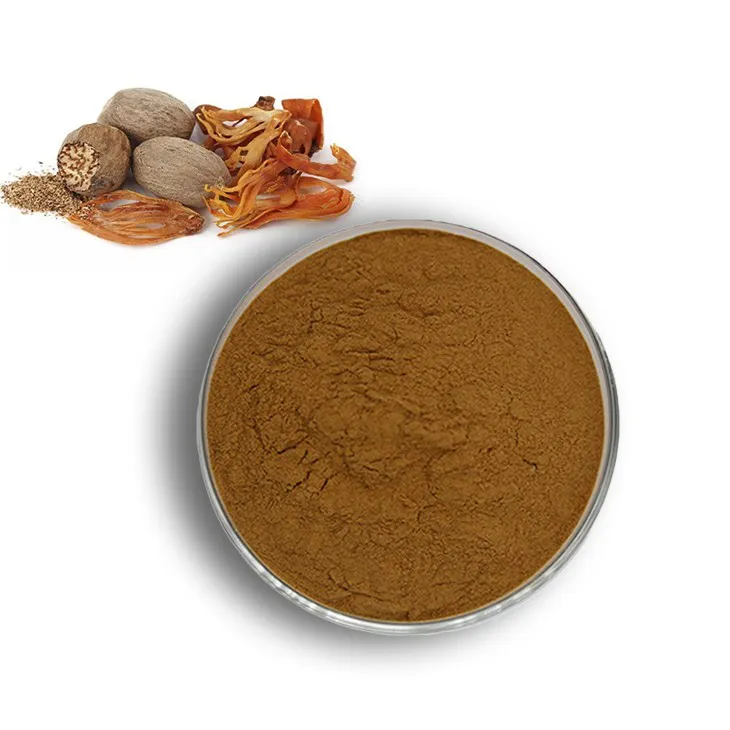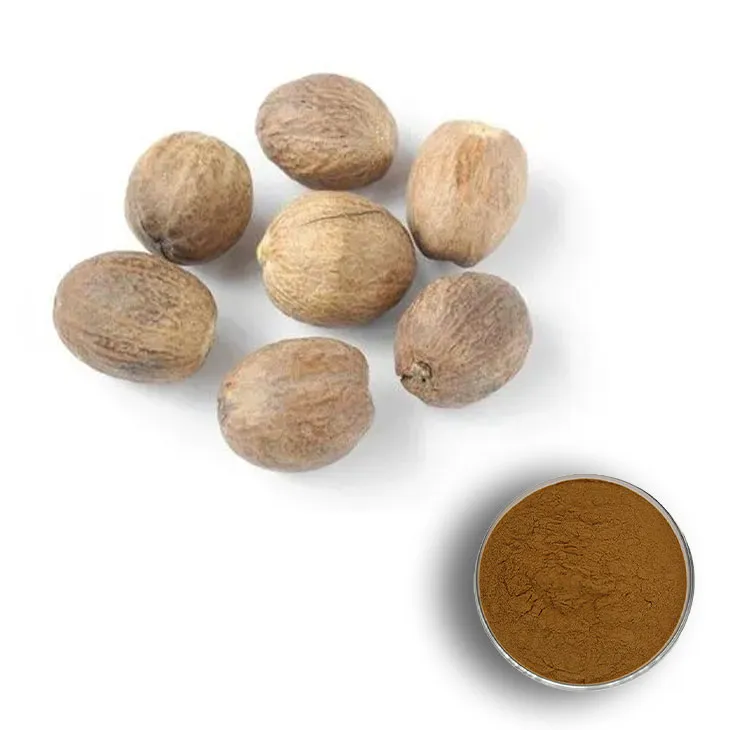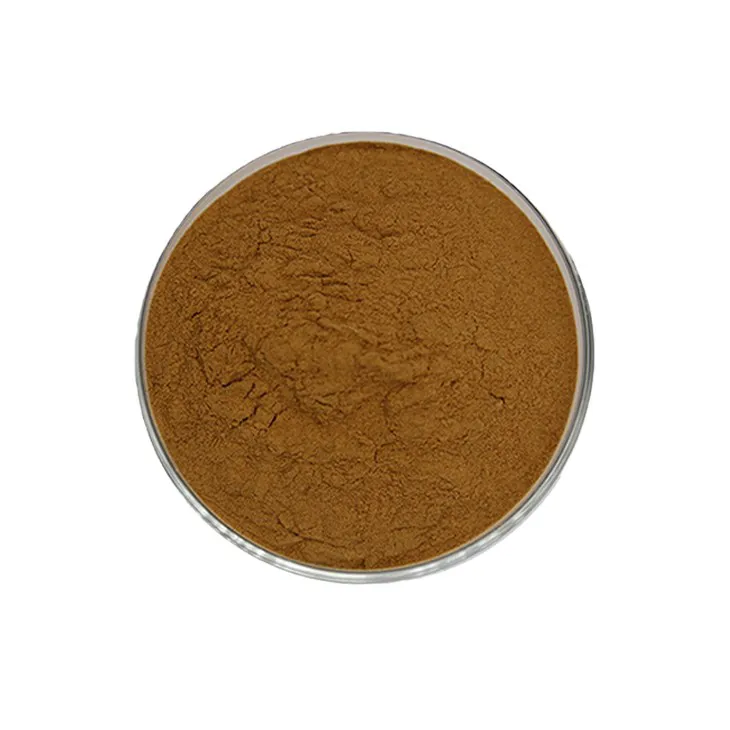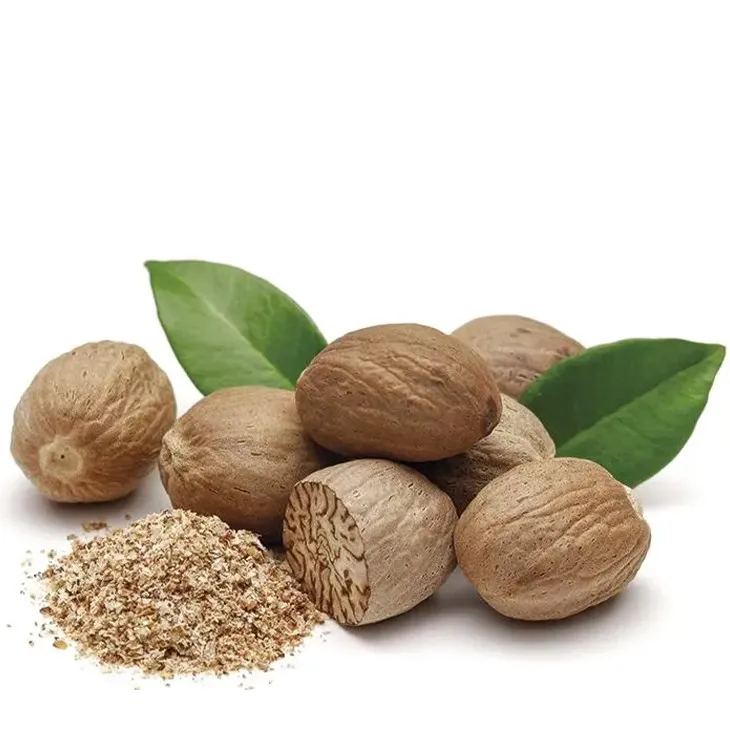- 0086-571-85302990
- sales@greenskybio.com
Nutmeg extract: Benefits, uses and possible side effects.
2024-11-14

1. Introduction
Nutmeg, the seed of the Myristica fragrans tree, has been used for centuries in various cultures for its culinary and medicinal properties. Nutmeg Extract, which is obtained from this seed, is now gaining more attention in different fields. It contains a variety of bioactive compounds that contribute to its potential health benefits, diverse uses, and also the need to be aware of possible side effects.

2. Benefits of Nutmeg Extract
2.1 Antioxidant Properties
Nutmeg Extract is rich in antioxidants such as phenolic compounds. Antioxidants play a crucial role in protecting the body's cells from damage caused by free radicals. Free radicals are unstable molecules that can cause oxidative stress, which is associated with various chronic diseases including heart disease, cancer, and neurodegenerative disorders. By neutralizing free radicals, the antioxidants in nutmeg extract may help in reducing the risk of these diseases.
2.2 Anti - Inflammatory Effects
Studies have suggested that nutmeg extract may possess anti - inflammatory properties. Chronic inflammation is a factor in many health problems, such as arthritis, inflammatory bowel disease, and skin disorders. The compounds in nutmeg extract may help to modulate the body's inflammatory response. For example, it may reduce the production of inflammatory cytokines, which are signaling molecules that promote inflammation in the body.
2.3 Digestive Health
Nutmeg has a long history of use in traditional medicine for digestive issues. Nutmeg extract can stimulate the digestive system. It may help in increasing the production of digestive enzymes, which are essential for the breakdown of food. This can improve digestion and absorption of nutrients. Additionally, it may also have a soothing effect on the gastrointestinal tract, helping to relieve symptoms such as indigestion, bloating, and stomach cramps.
2.4 Brain Health
Some research indicates that nutmeg extract may have positive effects on brain health. It may contain compounds that can cross the blood - brain barrier. These compounds could potentially enhance cognitive function, including memory, concentration, and learning ability. There is also some evidence to suggest that it may have a neuroprotective effect, which could be beneficial in preventing or slowing down the progression of neurodegenerative diseases such as Alzheimer's and Parkinson's.

3. Uses of Nutmeg Extract
3.1 Culinary Uses
Nutmeg extract is widely used in the culinary world. It has a warm, spicy, and slightly sweet flavor. It is commonly used in baking, for example, in cakes, cookies, and pies. It is also added to savory dishes such as stews, curries, and mashed potatoes. In addition to enhancing the flavor of food, nutmeg extract can also add a pleasant aroma. A small amount of nutmeg extract can transform the taste profile of a dish, making it more complex and enjoyable.
3.2 Cosmetic and Skincare Applications
In the cosmetic industry, nutmeg extract is used in various skincare products. Its antioxidant and anti - inflammatory properties make it suitable for treating skin problems. It can be used in creams, lotions, and masks for acne - prone skin. Nutmeg extract may help to reduce inflammation associated with acne, as well as prevent the formation of new pimples. It may also be beneficial for aging skin, as the antioxidants can help to fight free - radical damage and improve skin elasticity.
3.3 Traditional Medicine
In traditional medicine systems around the world, nutmeg has been used for a variety of ailments. For example, in Ayurvedic medicine, it has been used to treat respiratory problems, joint pain, and insomnia. In traditional Chinese medicine, it has been used for its warming properties to improve circulation and relieve pain. Although modern scientific research is still exploring the full extent of its efficacy in these areas, the long - standing use in traditional medicine provides a basis for further investigation.
3.4 Aromatherapy
The pleasant aroma of nutmeg extract makes it useful in aromatherapy. When diffused in the air, it can create a relaxing and calming atmosphere. It may help to reduce stress, anxiety, and promote better sleep. The scent of nutmeg can also be used in combination with other essential oils in massage oils to enhance the overall relaxation effect.

4. Possible Side Effects of Nutmeg Extract
4.1 Toxicity in Large Doses
While nutmeg extract has potential benefits, it is important to note that in large doses, it can be toxic. Nutmeg contains myristicin, which in excessive amounts can cause a range of symptoms. These may include nausea, vomiting, dizziness, and even hallucinations. In extreme cases, very large doses of nutmeg can be life - threatening. It is crucial to use nutmeg extract in moderation and follow recommended dosages.
4.2 Allergic Reactions
Some individuals may be allergic to nutmeg extract. Allergic reactions can range from mild symptoms such as skin rashes, itching, and swelling to more severe symptoms like difficulty breathing and anaphylactic shock. People with known allergies to spices or nuts should be especially cautious when using products containing nutmeg extract.
4.3 Drug Interactions
Nutmeg extract may interact with certain medications. For example, it may interact with blood - thinning medications, as some of its compounds may have an effect on blood clotting. It is important for individuals taking medications to consult their healthcare provider before using nutmeg extract to avoid potential adverse interactions.

5. Conclusion
Nutmeg extract offers a range of potential benefits, from antioxidant and anti - inflammatory effects to various uses in cooking, skincare, traditional medicine, and aromatherapy. However, it is essential to be aware of its possible side effects, including toxicity in large doses, allergic reactions, and drug interactions. By understanding these aspects, individuals can make informed decisions about using nutmeg extract, whether for health, culinary, or other purposes. With further research, the full potential of nutmeg extract may be more fully realized, and its safe and effective use can be better promoted.
FAQ:
What are the main benefits of nutmeg extract?
Nutmeg extract has several potential benefits. It may have antioxidant properties, which can help in fighting against free radicals in the body. It has also been associated with anti - inflammatory effects, potentially reducing inflammation in the body. Additionally, in traditional medicine, it has been used for digestive issues such as relieving indigestion and improving stomach function.
What are the traditional uses of nutmeg extract?
Traditionally, nutmeg extract has been used in cooking as a spice to add flavor to various dishes, especially in sweet and savory recipes. In herbal medicine, it has been used to treat ailments like nausea, vomiting, and diarrhea. It was also sometimes used as a natural remedy for insomnia due to its possible sedative effects.
How is nutmeg extract used in modern industries?
In modern industries, nutmeg extract is used in the food and beverage industry as a flavoring agent in products like baked goods, confectionery, and alcoholic beverages. It is also being explored in the cosmetic industry for its potential antioxidant and anti - inflammatory properties, which may be beneficial for skin health. Additionally, in the pharmaceutical industry, research is being conducted on its potential medicinal uses.
What are the possible side effects of nutmeg extract?
When consumed in large amounts, nutmeg extract can have negative side effects. It may cause hallucinations, dizziness, and nausea. High doses can also lead to a rapid heartbeat, dry mouth, and in severe cases, it can be toxic. Pregnant women should be especially cautious as excessive nutmeg extract consumption may pose risks to the fetus.
How can one ensure safe use of nutmeg extract?
To ensure safe use of nutmeg extract, it is important to follow recommended dosages. As a spice in cooking, normal culinary amounts are generally safe. However, when using it for medicinal purposes or in supplements, it is advisable to consult a healthcare professional. Avoid consuming large amounts of pure nutmeg extract without proper guidance, especially if you have pre - existing health conditions or are taking medications.
Related literature
- The Health Benefits of Nutmeg Extract: A Comprehensive Review"
- "Nutmeg Extract in Modern Industries: Applications and Implications"
- "Side Effects of Nutmeg Extract: A Critical Analysis"
- ▶ Hesperidin
- ▶ citrus bioflavonoids
- ▶ plant extract
- ▶ lycopene
- ▶ Diosmin
- ▶ Grape seed extract
- ▶ Sea buckthorn Juice Powder
- ▶ Beetroot powder
- ▶ Hops Extract
- ▶ Artichoke Extract
- ▶ Reishi mushroom extract
- ▶ Astaxanthin
- ▶ Green Tea Extract
- ▶ Curcumin Extract
- ▶ Horse Chestnut Extract
- ▶ Other Problems
- ▶ Boswellia Serrata Extract
- ▶ Resveratrol Extract
- ▶ Marigold Extract
- ▶ Grape Leaf Extract
- ▶ blog3
- ▶ blog4
- ▶ blog5
-
Organic Tongkat Ali extract powder factory.
2024-11-14
-
How to make powder with ashwagandha extract.
2024-11-14
-
Rosehip extract manufacturers from China.
2024-11-14
-
The best cat's claw extract in nature.
2024-11-14
-
Chinese Dandelion Leaf Extract Suppliers.
2024-11-14
-
Milk Thistle Extract
2024-11-14
-
Boswellia Serrata Extract
2024-11-14
-
Bayberry Extract
2024-11-14
-
Lycopene
2024-11-14
-
Black Garlic Extract
2024-11-14
-
Peppermint Extract Powder
2024-11-14
-
Giant Knotweed Extract
2024-11-14
-
Artichoke Leaf Extract
2024-11-14
-
Baicalin
2024-11-14
-
Rosemary extract
2024-11-14





















